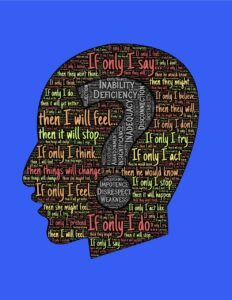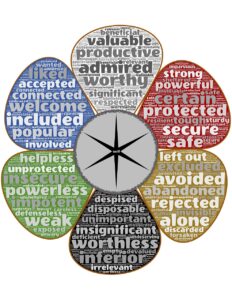TL;DR:
– Anxiety Coping Strategies: Explore 5 empowering techniques to conquer stress.
– Exercise’s Anxiety Alleviation: Discover the impact of regular exercise and yoga on anxiety management.
– Healthy Eating for Anxiety Relief: Uncover the diet-anxiety link and the foods aiding anxiety reduction.
– Sleep Quality’s Anxiety Influence: Learn about the significant effects of sleep hygiene and napping on anxiety levels.
– Mindfulness and Anxiety Control: Embrace mindfulness practices and success stories to combat anxiety effectively.
Introduction
Ever grappled with an overwhelming feeling of entrapment and restlessness? I’ve been there- it’s not a riddle, but Anxiety, one of the most common yet overlooked issues we encounter. As a specialist in well-being and self-improvement, I struggled too, but guess what? I overcame this hurdle and you can too! This blog uncovers some empowering ‘Anxiety Coping Strategies’ that helped me regain my inner strength. Let’s dive in, understand these techniques, and defeat anxiety together! Remember, when you control your mind, you can conquer your life. In essence, let’s transform your stress to strength.
What is Anxiety and How Does it Impact Us?
Anxiety can be a tumultuous experience, causing a magnitude of effects on your daily life. But what is anxiety and how does it influence us? Let’s delve deeper.
Understanding the Concept of Anxiety
Anxiety is a natural human response to stress or perceived threats which can become problematic when it persists without any triggering events. As the World Health Organization has researched, it affects almost 264 million people globally.
Decoding the Symptoms of Anxiety
Its symptoms can range from feelings of unease to full-blown panic attacks. Some common signs can be an increased heart rate, restlessness, or persistent worrying. As per National Institute of Mental Health, it’s crucial to remember that these can vary from person to person.
How Anxiety Affects our Daily Life
Living with anxiety can greatly impact your lifestyle. It can affect decision-making, relationships, and even simple daily tasks. Notably, it can lead to less productivity at work or school. Arguably, anxiety coping strategies have become essential for maintaining well-being and improving self-improvement.
How Can Exercise Help in Managing Anxiety?
Exercise is a key pillar in handling anxiety. It not only improves physical health but also your emotional well-being.
The Power of Regular Exercise in Easing Anxiety
Regular exercise produces endorphins—chemicals in the brain that act as natural painkillers—and improves one’s ability to sleep, resulting in less anxiety. Even five minutes of aerobic exercise can stimulate anti-anxiety effects.
Best Practices for Exercising
Becoming physical doesn’t necessarily mean hitting the gym; even a brisk walk around your neighborhood can make a difference. Aim for at least 30 minutes a day, five days a week. Listen to your body and make sure to cool down after each routine.
Yoga and Anxiety: A Case Study
Studies have shown yoga to possess anxiety-easing properties. According to Harvard Medical School, it helps by enriching your mood and acting as a natural anti-depressant.
Can Eating Healthy Alleviate Anxiety Symptoms?
A balanced diet can be the foundation for a healthier mind. Sound nutrition can provide a considerable advantage in coping with anxiety.
The Connection Between Diet and Anxiety
Certain foods can increase anxiety levels while others can lower it. A high intake of vegetables, fruits, legumes, and whole grains can help manage it.
Nutritious Foods that Help Combat Anxiety
Foods rich in magnesium like spinach, nuts and seeds, lean proteins, and foods with omega-3 fatty acids (fatty fish, walnuts, and flaxseed) are proven to reduce anxiety symptoms.
Meal Plans for Anxiety Relief
Incorporating these anti-anxiety foods into your daily diet can substantially contribute to your well-being.
How Does Sleep Influence Anxiety Levels?
There’s a strong correlation between sleep deprivation and heightened anxiety levels. Therefore, adequate sleep is critical for managing anxiety.
The Link Between Sleep Deprivation and Anxiety
Insufficient sleep can result in more anxious feelings. On the contrary, a good night’s rest can make you feel more relaxed and ready to take on the day’s challenges.
Effective Sleep Hygiene Practices
Creating a relaxing bedtime routine, maintaining a regular sleep schedule, and designing a restful sleeping environment can all contribute to better sleep hygiene.
The Role of Napping in Anxiety Control
While naps aren’t a replacement for a night’s rest, short naps during the day can help manage stress and keep anxiety at bay.
Does Mindfulness Really Help in Controlling Anxiety?
Mindfulness can be a powerful tool in coping with anxiety. It allows us to become aware of our thoughts and feelings without getting swept up in them.
Understanding the Concept of Mindfulness
Mindfulness is a form of meditation where you focus on being aware of what you’re sensing and feeling in the moment, without interpretation or judgment.
Mindfulness Exercises to Keep Anxiety at Bay
Mindfulness practices like deep breathing, progressive muscle relaxation, and mindful eating can help reduce anxiety.
Success Stories of Incorporating Mindfulness into Daily Life
Many have found solace in mindfulness practice. The technique is widely acclaimed for its role in anxiety management and overall emotional regulation.
How Can Exercise Help in Managing Anxiety?
Daily exercise can work wonders in managing anxiety. Several studies have shown that regular physical activity can decrease overall levels of tension, elevate and stabilize mood, and improve sleep and self-esteem. It is an effective and natural method to alleviate anxiety symptoms without side effects of medication.
The Power of Regular Exercise in Easing Anxiety
Exercise acts as a natural anti-anxiety treatment. It reduces adrenaline and cortisol levels in the body, the body’s natural stress hormones while stimulating the production of endorphins, chemicals in the brain that are the body’s natural painkillers and mood elevators. Regular physical activity provides an outlet for frustrations and releases mood-enhancing chemicals that can help to keep anxiety in check. According to the Anxiety and Depression Association of America(ADAA), even a brief walk can deliver several hours of relief from anxiety.
Best Practices for Exercising
When it comes to exercising, consistency is key. The ADAA recommends regular participation in any exercise that you enjoy to keep it from feeling like a chore. This could be walking, swimming, dancing, or cycling. Start slow, and gradually increase the intensity and duration of your workouts. Aim for a minimum of 30 minutes most days of the week.
Yoga and Anxiety: A Case Study
Yoga is among those exercises that not only help in improving physical health but also aids in improving mental health. It combines physical postures, breath control, and meditation to reduce stress and anxiety. A 2014 study published in JAMA Internal Medicine found that mindful meditation, like that practiced in yoga, can help ease psychological stresses like anxiety. Increasingly, yoga is being recognized as a legitimate and effective method to aid in anxiety management.
Can Eating Healthy Alleviate Anxiety Symptoms?
Ever wondered if what’s on your plate can influence your emotional well-being? In fact, a healthy diet can be a key player in managing anxiety. When our bodies receive proper nutrition, they are better equipped to handle stressors, leading to a possible reduction of anxiety symptoms.
The Connection Between Diet and Anxiety
A balanced diet is not only essential for physical health but also for mental wellness. Researches have found a correlation between a diet high in processed and sugary foods and increased levels of anxiety. On the contrary, a diet rich in whole foods, especially those rich in vitamins B and D, omega-3 fatty acids, and antioxidants, might help reduce anxiety symptoms. Check out this study that provides a detailed examination of the association.
Nutritious Foods that Help Combat Anxiety
Some foods have been identified as particularly beneficial in managing anxiety. These include:
– Blueberries and peaches, rich in stress-reducing antioxidants and Vitamin C.
– Avocados, almonds, and milk, full of vitamin B, essential for healthy nerves and brain cells.
– Oily fish like salmon, packed with omega-3 that helps keep adrenaline and cortisol from spiking during stressful situations.
– Whole grains, great sources of magnesium and tryptophan, which the body converts to serotonin, a mood-boosting hormone.
Meal Plans for Anxiety Relief
Planning meals can be an effective strategy for ensuring you are consuming anxiety-reducing foods regularly. Start with integrating healthy options into each meal and snack, while cutting back on processed, sugary items. For example, breakfast could be oatmeal with berries, lunch could be a salad with lean protein and whole grain bread, and dinner might be salmon with quinoa and steamed vegetables. Remember, regularity and balance are keys to a healthier diet and potentially lesser anxiety symptoms.
You can look up Healthline’s guide on foods that reduce anxiety, to get more ideas for your meal plans.
How Does Sleep Influence Anxiety Levels?
Are you aware that the quality of your sleep can significantly impact your anxiety levels? As surprising as it may seem, studies have increasingly drawn links between poor sleep and heightened anxiety. By understanding this connection, you can implement appropriate anxiety coping strategies that improve both your sleep and overall emotional health.
The Link Between Sleep Deprivation and Anxiety
Sleep deprivation and Anxiety Coping Strategies share a reciprocal relationship. Research has suggested that lack of sleep can exacerbate anxiety symptoms, while anxiety can in turn lead to sleep-related issues like insomnia. Chronic sleep deprivation can increase the risk of developing an anxiety disorder. It’s a vicious cycle that can be hard to break, but awareness and proactive measures can control it.
Effective Sleep Hygiene Practices
Effective sleep hygiene practices are an essential part of anxiety coping strategies. Good sleep hygiene includes maintaining a consistent sleep schedule, creating a relaxing sleep environment, avoiding caffeine and alcohol close to bedtime, and limiting exposure to screens before bed. Such practices not only improve sleep quality but can also help reduce anxiety levels.
The Role of Napping in Anxiety Control
While napping is often seen as a convenient way to catch up on lost night sleep, it’s important to remember that it can disrupt your regular sleep patterns. Paradoxically, this might increase feelings of anxiety. Napping should, therefore, be approached considerately and limited to short durations of about 20 to 30 minutes when necessary.
Remember, adequate sleep works hand in hand with other anxiety coping strategies like regular exercise and a healthy diet, offering a comprehensive approach to anxiety management. For more guidance on how sleep affects anxiety, check resources like the American Psychological Association for further insights.
Does Mindfulness Really Help in Controlling Anxiety Coping Strategies?
Experts in psychology and mental health have long advocated mindfulness as a powerhouse tool for combating stress and anxiety. Mindfulness helps us to break free from the shackles of our incessant worries and fear by promoting a deeper connection with the present moment. But does it actually work? Let’s examine this closely.
Understanding The Concept of Mindfulness
Mindfulness refers to the process of bringing one’s attention to experiences occurring in the present moment without judgement.With consistent practice, mindfulness can train the mind to respond, not react to anxiety-inducing situations. It’s almost like installing a new operating system in your brain that guides you to pause, process and then proceed.
Mindfulness Exercises to Keep Anxiety at Bay
There are numerous simple mindfulness exercises that can be practiced anytime, anywhere. Here are a few:
– Mindful Breathing: Observe your breath. Breathe in for a count of 5, hold for a count of 5 and exhale for a count of 5. Purposefully slowing down your breathing has been proven to reduce anxiety.
– Mindful Eating: Pay close attention to the taste, texture, and smell of your food. This will not only savor each bite but also create a calming, meditation-like state.
– Body Scan: Starting from the tip of your toes to the top of your head, bring attention to each part of your body, noting any sensations, tension, or discomfort.
Success Stories of Incorporating Mindfulness into Daily Life
There are a plethora of stories of people who have managed to incorporate mindfulness into their everyday life and have seen dramatic improvements in their anxiety levels. Take the example of [Michael, a corporate lawyer](https://www.mindful.org/a-lawyer-finds-the-strength-to-be-vulnerable/), whose demanding job fuelled his chronic anxiety. After being introduced to mindfulness, Michael not only reported a significant drop in anxiety levels but also found himself much more focused, productive, and emotionally resilient.
Embracing mindfulness as an Anxiety Coping Strategies strategy can greatly enhance your well-being and self-improvement journey. It reminds us that we are more than our anxious thoughts and feelings and that peace is always present within us, amidst the chaos. The next section of this article will help sum up all the information covered so far and help you find your unique path towards overcoming anxiety.
Conclusion:
In this exploration of Anxiety Coping Strategies, we’ve uncovered a treasure trove of empowering techniques to conquer stress. From mindfulness practices to strategic self-care rituals, each strategy offers a beacon of hope in navigating life’s tumultuous challenges. By incorporating these proven methods into your daily routine, you can cultivate resilience and reclaim your inner peace. Embrace these Anxiety Coping Strategies as your arsenal against anxiety, and venture forth with renewed vigor. Ready to dive deeper into the realm of stress management? Explore our array of resources and unlock the path to lasting tranquility.













